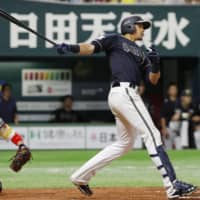Ralph Bryant is 58 years old and hasn’t played top-level baseball since his final season with the Kintetsu Buffaloes in 1995.
But on Thursday morning, he was wearing a baseball glove and needed to call on his old reflexes again to keep up with an energetic group of elementary-aged children who wanted to play catch with an NPB great.
Bryant, who hit 259 home runs in eight seasons in Japan, held a baseball clinic for children on Thursday at Tokyo City University Elementary School in the capital’s Setagaya Ward.
“It was just a great moment to be out here with the kids,” Bryant said.
Masanori Murakami, a former pitcher for the San Francisco Giants and Japan’s first MLB player, also attended the event, which was sponsored by the Japan Retired Foreign Players Association with Setagaya Ward and the U.S. Embassy Tokyo serving as co-hosts.
Despite some cloudy weather, the clinic drew a nice crowd of kids and parents, with many of the latter having been fans of Bryant during his playing days.
“I think it’s awesome,” Bryant said. “Their parents watched me play, so now I feel like I’m the old man on the block. It’s always good to come back and just see different generations pass things down to their kids. Like, ‘this guy played here when I was a kid watching baseball.’ So it’s just good to see that happening and come back and share that experience with them.”
Bryant and Murakami told the kids about their experiences as players in Japan and the United States in the school’s gymnasium. The two retired stars then joined them for stretching exercises.
Once everyone headed outside, Bryant gave the kids some pointers on how to throw a ball and played catch with many of them. Murakami also readily interacted with the attendees, showing one boy the grip for a forkball and demonstrating throwing techniques for a different group.
The two stars signed balls, caps and often the shirts the kids were wearing and took both group and separate photos with them.
“I enjoyed it,” said 7-year-old Kei Takabayashi, who was there with his father Satoru. “He (Bryant) was cool.”
For his father, it was a chance to introduce his son to someone he thought was cool when he was younger.
“I know about Kintetsu Buffaloes, so I know him,” said Satoru, a Kyoto native who rooted for Kintetsu. “I watched live on TV and he’d hit home runs. My image of him is he is a legend among batters.”
Bryant played for the Los Angeles Dodgers from 1985-87 and then in the NPB minor leagues for the Chunichi Dragons before joining the Buffaloes (who later merged with the Orix BlueWave and became the Orix Buffaloes for the 2005 season) during the 1988 season. He hit 34 homers in 74 games to help Kintetsu charge back into the pennant race.
His last homer came during the famed “10.19” doubleheader on Oct. 19 that year, with Kintetsu needing to win both games against the Lotte Orions to win the pennant. The Buffaloes won the opener but finished in a 4-4 tie in the second game — with Bryant homering in the eighth inning — to finish two percentage points behind the league champion Seibu Lions.
He really showed what he could do in his first full season, hitting .283 with 49 homers and 121 RBIs in 1989, winning the PL MVP award and helping the Buffaloes capture the pennant.
Bryant was named to the PL Best Nine team three times and also made three All-Star teams. After not being able to establish himself in three seasons with the Dodgers, Bryant became a superstar in Japan.
“Sometimes people who are struggling in the United States come here to Japan and they start to really show their strength,” Murakami said. “Maybe the U.S. baseball style wasn’t a fit for them and coming here changed that. Then after that, they go back to the States and make a comeback in the major leagues.”
Bryant, who is scheduled to throw out the first pitch before the Orix Buffaloes’ game against the Hokkaido Nippon Ham Fighters on Sunday at Kyocera Dome, is hopeful of continued interactions between the sports worlds in Japan and the U.S.
“The more you do exchanges, the more you learn about each other’s culture,” he said. “I think it’s a great thing for both countries and hopefully in the future it’ll get better and better and better.”
Source : Baseball – The Japan Times


